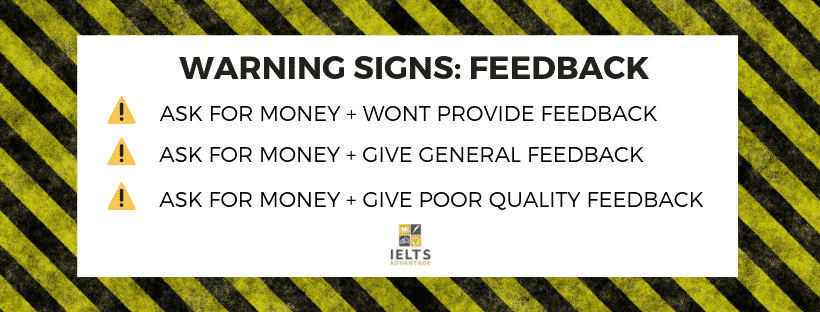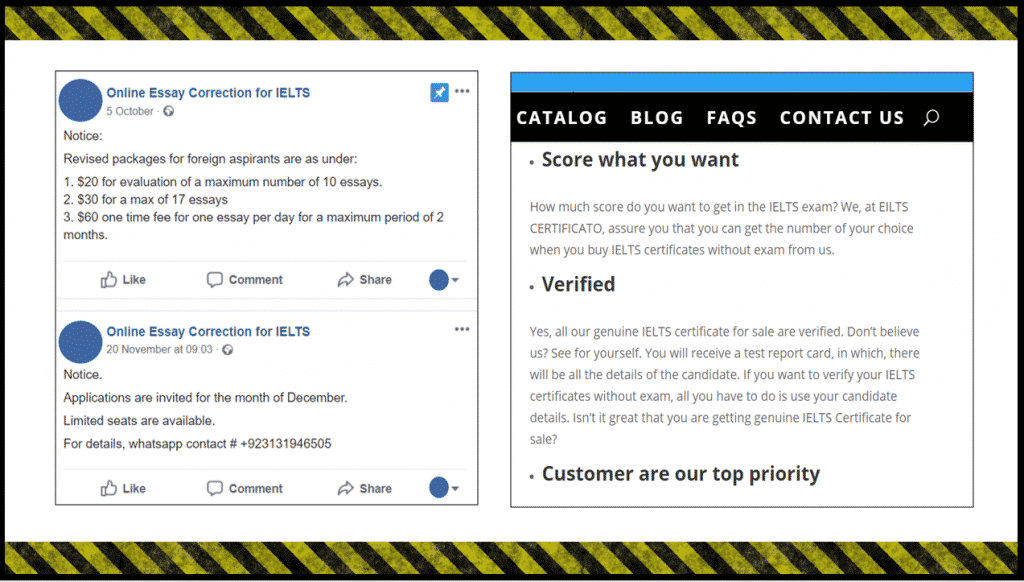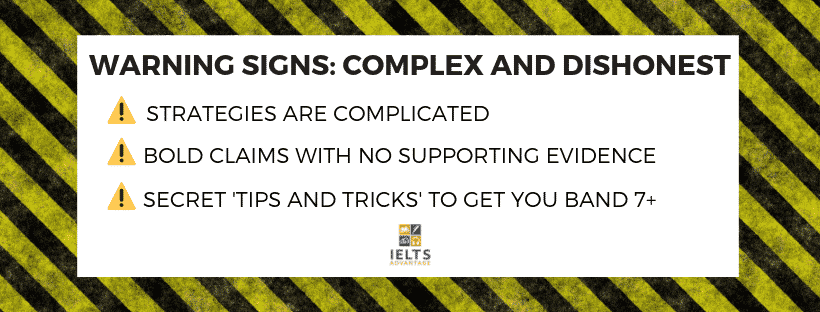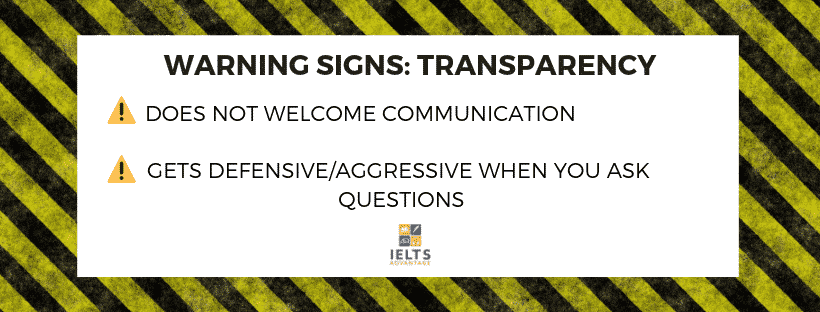Millions of people take the IELTS exam every year, many of whom choose an online course or teacher to help with their preparation.
This means that deciding which IELTS course or tutor to choose has never been more difficult.
The reason for this is simple: online IELTS teachers are not regulated.
Sadly, the demand from desperate students seeking help for their IELTS exam has resulted in an increase in scammers pretending to teach IELTS – many of which haven’t taken the IELTS test before themselves!
Consequently, thousands of hard-working test-takers have wasted their money on poor-quality materials and damaged their chances of getting a good score in the exam. This article will show you exactly how to spot such dishonest companies – also known as scams.
I should make it clear now that I do not have the capacity to help everyone pass the IELTS exam. However, I can help prevent you from wasting your time, money and effort using a fraudulent online course or teacher. This will make it much easier for you to identify courses or tutors that you know can help you get the score you need in the IELTS test.
How can I tell if a course can help me?
Feedback
An effective IELTS course shows you the exact weaknesses that will cost you marks in the exam. IELTS examiners mark you down for specific reasons related to your own mistakes.
Therefore, getting professional feedback on your exam skills is essential to serious IELTS preparation. To make sure that you aren’t getting scammed, you must ask yourself the following questions:
- Will I receive feedback?
- Will the feedback be general or specific to my work?
- Can the feedback help me?
It is important to note that generalised feedback you receive from a paid course is most likely not worth your money. This is because sharing generalised advice with countless other IELTS pupils will only help you to a certain extent.
If you don’t know exactly where you’re going wrong, you won’t learn how to improve.
Get a solid understanding of the quality of feedback you should expect from an IELTS feedback service.
 Expertise
Expertise
I’ve already mentioned that there are many dishonest online teachers that don’t have actual IELTS experience. To get the most out of a course, you should make sure that your tutor is an IELTS expert.
To know whether your tutor is reliable, you need to find the answers to the following questions:
- Is your teacher qualified?
- Is your teacher experienced at teaching IELTS?
A trustworthy IELTS tutor needs to have passed the exam themselves (if they are a non-native speaker). Otherwise, they will have very little knowledge about what it takes to get your required score.
However, simply passing the exam is not enough. If you are paying for a tutor, you want one that can effectively convey strategies that will help you improve your skills. This standard of teaching requires years of experience of both teaching IELTS and helping people get the scores they need.
 Simple and honest
Simple and honest
When it comes to preparing for the IELTS exam, the best piece of advice I could give you is to keep it simple.
This is because the IELTS exam has been overcomplicated by teachers that want you to think that you need their help. An easy way to make money is to tell people that the IELTS exam is difficult and the solution is complicated but expensive.
Truthfully, the IELTS exam is easy once you know what you’re doing. A company that tells you anything different is either uninformed or lying to you.
Furthermore, many online teachers and courses make money from empty promises. But not even the best course in the world can guarantee a score if you don’t invest the time or energy.
Take a look at the images below.
When I searched for cheap IELTS preparation courses on Google, I came across the images above. At first glance, they might look pretty promising. But you need to ask yourself – are these claims feasible?
The image on the left promises 10 essay evaluations for $20.
It takes around 20 minutes for an examiner to read and grade an IELTS essay. Do you think these prices are suited to pay for their time?
The image on the right promises IELTS success without even having to take the exam!
Be very cautious about such outrageous promises, and remember: when it comes to low-cost IELTS courses – if it sounds too good to be true, it probably is.
(There are also consistent spelling and grammar errors in the screenshots above. This is a key indicator of a fake IELTS teacher!)
 Testimonials
Testimonials
Testimonials are the best form of evidence to prove whether a school or course is honest and helpful. The reason for this is simple: when people get the help they need, they like to send their thanks.
If a course or company doesn’t have any testimonials, they probably have never helped anyone before.
However, like everything on the internet, you need to be wary when regarding testimonials and ask yourself the following questions:
- Are these testimonials helpful?
- Do they provide an insight into the course?
- How do I know they weren’t written by members of staff?
If the answers to these questions are negative, then it is likely that the testimonials are not authentic and the company is not trustworthy. The best way for companies to share testimonials is through platforms that prove their existence, such as videos on YouTube or images on Facebook or Instagram. If you truly can’t tell whether a testimonial is real – it probably isn’t. For an idea of the standard of testimonials to expect from a reliable online company, take a look at our Success Stories.
 Transparency
Transparency
I would like to conclude with the best way to validate an online course: always ask questions.
Communicate with the team that runs the company whether it is via email, their website or social media. You will never offend an honest IELTS tutor if you ask about their feedback, expertise, methods or testimonials.
An online service should always respond to your questions with friendliness and useful information.
If you receive a defensive or aggressive response, it is a clear indication that the individual speaking to you either does not know the answers to your questions or simply doesn’t care about your IELTS performance and wants to take your money.
I hope this blog post has made it easier for you to identify the difference between an IELTS scam and an authentic IELTS course that will truly help you get the score you need to achieve your goals.
As ever, feel free to email me if you have any questions about your IELTS preparation or need professional help to get the score you need: chris@ieltsadvantage.com

 Expertise
Expertise Simple and honest
Simple and honest
 Testimonials
Testimonials Transparency
Transparency
